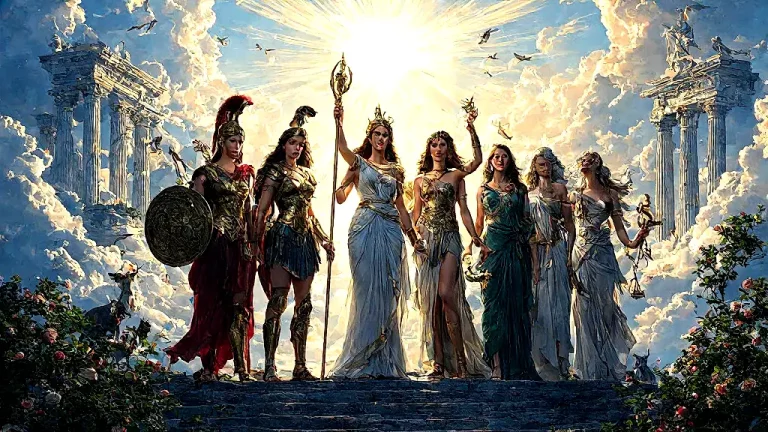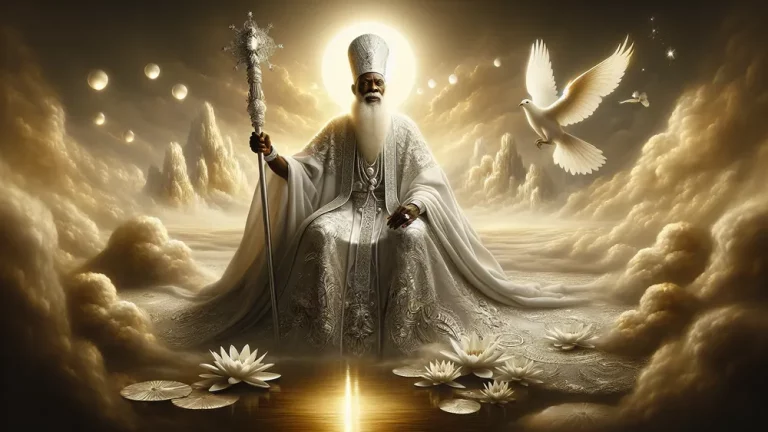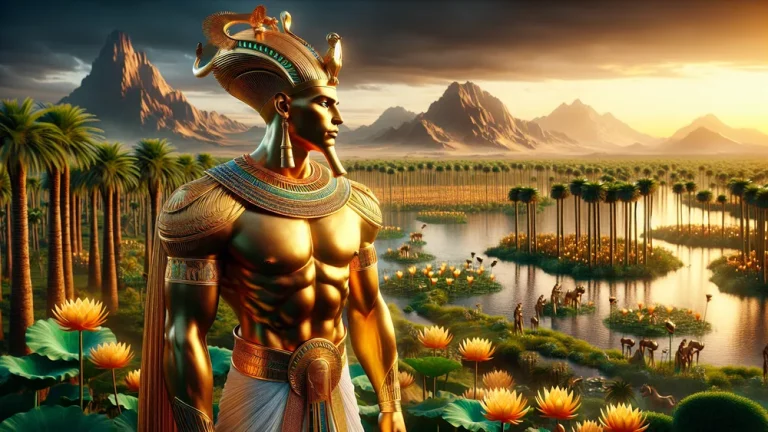Hedone: Greek Spirit Of Pleasure And Daughter Of Eros
In the world of Greek mythology, there’s Hedone, an interesting person, being the meaning of pleasure and joy. So, think about this journey into her story as, in a way, experiencing that happy feeling you have during a fun event or just enjoying something you love.
Key Points:
- Hedone is the Greek spirit of joy, daughter of Eros and Psyche.
- She stands for the mix of love and soul, spreading happiness.
- Hedone links gods and humans, bringing joy beyond limits.
- Seen in art as grace and calm, she inspires pleasure themes.
- Her ideas were big in Greek culture, affecting festivals and art.
- Similar to Roman Voluptas, she means joy across cultures.
- Her influence lasts today, seen in our search for happiness.
And this story, it starts with Eros, who’s the god of love, and Psyche, who’s all about the soul, which kind of means when love and spirit mix well. This beginning gives you a look at the interesting world of Hedone, and lets you start knowing her place and how she’s important in Greek stories.
And as you learn more, it’s clear how Hedone goes beyond stories, into things like art, science thinking, and how people lived back then, also showing similar gods in other places.
Hedone: Overview and Key Facts
| Key Aspect | Details |
|---|---|
| Name | Hedone |
| Meaning | Joy, Fun |
| Family Background | Daughter of Eros, the love god, and Psyche, who is the soul |
| What It Stands For | Seems to mean love and soul mixed, and it is about joy and smiles |
| What She Does in Greek Stories | As the joy god, she influences gods and humans with how she is |
| Cultural Influence | Left a mark on Greek stories, art, thinking, and everyday happenings; appearing with events and normal stuff |
| Linked Gods | Related closely to Aphrodite, the love goddess, and Dionysus, who likes parties and wine |
| Roman Mythology Match | The Roman counterpart is Voluptas, who shares same traits and importance over there |
| Thinking and Ideas | Discussed a lot in ideas around joy and fun, especially in thought groups like Epicureanism |
| Seen in Art | You can often see her in statues and paintings as a sign of joy and being happy |
The Roots of Hedone
If you want to really get Hedone’s spot in Greek stories, it’s important because knowing helps to look at where she started and the stories she comes out from. We look into the interesting story of when she was born and the part she has in the group of Greek gods.
The Birth of Hedone
Hedone’s beginning starts with the charming story of her parents, Eros and Psyche, who together are a big part of Greek stories. Eros, love’s god, and Psyche, who is what human spirit means, are about the perfect mix of feelings and heart. Their story, which has tough parts and good times, leads to Hedone’s start, showing how love and spirit work well together. Moreover, think of Hedone as the joy that comes from a close feeling between people, much like the joy from a good friendship or romance. Her arrival is more than just an old story, but it really shows how love and heart join to make fun and pleasure. To see how she’s important, let’s look at these main points about her start:

- Family Background: She is Eros and Psyche’s child, meaning love and the soul.
- What it Stands For: It means the mixing of spirit and love, leading to happiness.
- Her Part in Stories: It’s about connecting heavenly love and human life.
Hedone is the child of Eros and Psyche, symbolizing how love and the soul come together to create happiness.
Hedone’s Role in Greek Myths
As an example in the big area of Greek stories, Hedone appears as pleasure and delight, something that connects strongly with the gods and people. Much like the happiness felt during a big gathering, where there’s lots of laughter, Hedone’s part often means the times when joy is the highest, reminding everyone of the pleasures life has.

But her part isn’t just in the world of gods; she connects gods and people, bringing joy that goes beyond normal limits. Her influence also touches the family of Greek gods, often linked to times of fun and feeling good. You get it in stories where gods find joy, like the beauty in nature, winning something, or even warm togetherness.
For example, when there’s a big feast or party, Hedone is in these stories, showing the fact that pleasure matters even up high. It shows that even gods, with their endless power, look for joy and fun moments. For people, Hedone’s wave is just as strong. She stands for chasing happiness and reaching wants, like how good it feels to finish something or enjoy things you love.
In stories when people look for joy and feeling peaceful, she is like a guide showing how everyone looks for happiness. Her part says that pleasure is part of living, a gift which makes life better and keeps things balanced. Through this, the stories give a simple idea – that looking for happiness is a worthy aim both gods and humans reach for.
Symbols and Meaning of Hedone
To really get why Hedone matters in Greek stories, it’s important to look at the symbols and meanings that link to her. How she appears in art and writing, also, what people thought about her part, let’s look into these things.
Hedone in Art and Stories
In ancient Greek times, people showed Hedone as a charming beauty, all about pleasure and delight. Similar to modern ways happiness is pictured with bright colors, this is what they aimed for. Artists and writers tried different ways to picture her allure, using these to get across why she matters. In sculptures, Hedone might appear with calm happiness, often with things that mean a lot of joy and richness. Paintings would turn up with her in happy scenes, with other gods or people enjoying the moment. Stories talk about Hedone as someone giving joy, putting her in tales where being happy is what matters. To look at her better, consider these things:

- Sculptures: Often means Hedone with calm looks, content.
- Paintings: Appear in happy scenes, focus on her part in joy.
- Literary References: Central in stories about pleasure.
What Philosophers Thought About Hedone
In the area of old Greek ideas, that Hedone is an example of pleasure brought about big discussions among those thinking about how pleasure fits in life. We can look at this thinking as similar to today’s talk about trying to find happiness and feeling satisfied.
Epicurus, who was well-known, saw pleasure as life’s main aim, supporting easy and wise living to get calm and avoid hurt. He was firm in his view that Hedone meant how people naturally want to be happy through thoughtful and basic living. This idea was very important for ways of thinking that focus on pleasure as a rule in making good choices.
Yet others did not all feel the same. Interestingly, some, like the Stoics, said true happiness is from good actions and control, not just from chasing pleasure. They saw Hedone as possibly pulling one away from the path of wisdom and good character. For them, following pleasure could mean going too far and cause imbalance, which could keep people from living well.
Thus, this different thinking shows how Hedone’s image is seen in many ways, mirroring the wide talks about pleasure’s place in our lives. Through them, old thinkers tried to understand where pleasure fits in the large story of living well.

How Hedone Gets Along with Other Gods
Since we talked about what Hedone means in philosophy, now let us see her connections with other gods and how these ties can better explain her place in the Greek pantheon.
Ties with Aphrodite and Dionysus
Hedone’s connections with Aphrodite, the goddess of love and beauty, are especially important in seeing her part in the Greek gods’ group. Since she is Eros’, who is Aphrodite’s son, daughter, Hedone has a family bond with her grandmother. You could think of this relationship like how parts of joy and love come together in a happy time.
Aphrodite’s impact on Hedone means the basic link between love and pleasure, suggesting true joy often comes from bonds and looks. In stories, Hedone being with Aphrodite shows how love and pleasure blend easily, pushing how they work to make experiences better for gods and people. Likewise, Hedone’s ties with Dionysus, the god of wine and fun, further explain her part in myths of pleasure and celebration.
Dionysus, known for his wild parties and the joy he gives, matches Hedone’s meaning of pleasure. You could compare their being together to music and dance making a festival feeling. In stories with Hedone and Dionysus, what they bring often makes times of excitement and cheer, showing how pleasure and fun mix in Greek myths.
Through these relationships, Hedone’s place as one who means pleasure is not only pointed out but also expanded upon, showing her as a big part of the cheerful and fun parts of the divine world.
Hedone’s Influence in Ancient Greek Life
Since we’ve looked into who Hedone is with among the gods, we now can see how her meaning of joy and happiness spread through different parts of Greek society and culture. It was everywhere.
Her Mark on Greek Society and Culture
Hedone’s effect on Greek society is like how a big festival makes everyone happy and brings people together. Her example of pleasure and delight spread into many parts of everyday life, from large public events to quiet personal moments.

The gatherings for the gods often had activities that celebrate Hedone’s essence, like music, dance, and community meetings, which were made to bring people together in shared happiness. These gatherings not only honored the gods but also strengthened the cultural idea that pleasure and happiness are important parts of a good life.
With these events, Hedone became a part of Greek society, reminding people to see the power of joy in daily life. And in art, too, Hedone’s effect reached Greek art and stories, where her meaning of joy is often shown. Artists and writers present scenes of fun and happiness, capturing what Hedone means in what they make.
For example, art pieces might present lively meals or peaceful happy moments, showing how much culture likes pleasure and beauty. These artistic views are reflections of cultural beliefs, pointing out pleasure as something that inspires and fulfills.
By adding Hedone’s ideas into what they made, artists and writers kept her influence alive, making sure the idea of pleasure was always a big idea in Greek culture. Through these many ways, Hedone’s mark on Greek society was deep and lasting, changing how people felt and valued pleasure in their lives.
Hedone deeply influenced Greek society by embedding the value of pleasure and happiness into cultural events, art, and daily life, making it a lasting and important part of their existence.
Hedone’s Reach Beyond Greece
After we looked at how Hedone affected Greek people, now we see how her meaning of joy and happiness was liked by peoples beyond Greece. It was far-reaching.
Looking at Pleasure Gods in Different Cultures
When we look outside Greece, we find that the idea of a god being about pleasure is not just in Greek stories. For example, in Roman stories, there is Voluptas, a goddess a lot like Hedone. Just as Hedone is the child of Eros and Psyche, Voluptas is said to be the daughter of Cupid and Psyche, and this shows a family line that means everyone likes gods of pleasure.
Think about how different people celebrate joy and happiness in their own ways, but all aim to understand happiness and feeling good. This helps us see how Hedone and Voluptas, even from different stories, both mean the search for pleasure and happiness in human life.
To better see the similarities and differences between these gods, here is a table that tells about their roles, what they’re like, and their cultural importance:
| Deity | Mythology | Parentage | Role and Attributes | Cultural Significance |
|---|---|---|---|---|
| Hedone | Greek | Eros and Psyche | About pleasure and delight | Big in festivals and art, means joy |
| Voluptas | Roman | Cupid and Psyche | Goddess of pleasure, like Hedone | Celebrated in Roman culture, close to Hedone |
This table gives a simple look, meaning both Hedone and Voluptas are gods of pleasure, and each reflects their people’s ways and stories. With these comparisons, we can see how the idea of pleasure crosses borders, connecting with people in different times and places.
How Hedone’s Ideas Live On Today
The idea of Hedone, being about pleasure and happiness, still connects with today’s views of being happy and healthy. As ancient Greeks would celebrate Hedone with festivals and art, now we notice similar happiness in activities like personal success and free time.
Think about how people spend time on hobbies, going places, or trying to be mindful to take time to notice happiness – these activities come from the old love for pleasure that Hedone symbolized. When we know Hedone’s role in old stories, we see her ideas have gone past time, affecting current talks about choosing pleasure and having a meaningful life.

This lasting effect means the never-ending way people want to seek joy and feel satisfied, staying important now like it was long ago.
Hedone in Worship and Rituals
Since we have looked at how Hedone’s ideas still mean something today, let’s now see the way she was respected and remembered in ancient Greek religious ways.
Ancient Greek Ways of Honoring Hedone
In ancient Greece, people remembered Hedone with different activities and festivals, and these were about joy and delight, much like how we now celebrate community and happiness today.
Even though there aren’t a lot of documented rituals just for Hedone, she often appeared in the broader setting of events for her parents, Eros and Psyche, where ideas of love and the influence of pleasure were key. Think of a festival, with everyone enjoying music, dance, and shared meals. This means the happiness Hedone stands for.
These events gave ancient Greeks a chance to call upon her spirit, putting more pleasure and happiness into their lives. Through these gatherings, Hedone’s role became a part of everyday life, meaning people thought of joy and happiness as important.
Pantheon of Greek Spirits and Daimones
Greek spirits and daimones, they are a fascinating mix of myth figures that show different parts of what people feel and see in the world around them. These spirits and daimones, such as Hedone, gave crucial roles in lives of people then, affecting everything from how someone feels to events in nature.
Around these daimones, you find a set of characters in the grand stories, each adding their unique parts to Greek stories. For those wanting to see the full list of these interesting figures, a complete list of all the Greek Spirits and Daimones gives deeper views into their jobs and meaning.
This wide-ranging collection helps understand the detail and complexity of Greek stories, and how these figures shaped the old world’s life.
FAQs
1. Who were Hedone’s parents in Greek mythology?
In Greek mythology, Hedone’s parents were Eros, the god of love, and Psyche, the personification of the soul.
2. What does Hedone symbolize in ancient Greek culture?
In ancient Greek culture, Hedone symbolizes the embodiment of pleasure and delight.
3. Are there any famous myths involving Hedone?
Famous myths involving Hedone are scarce, as she is primarily referenced in the context of her parentage and symbolic representation of pleasure rather than as a central figure in specific stories.
4. How is Hedone depicted in ancient Greek art?
In ancient Greek art, Hedone is often depicted as a youthful and graceful figure embodying pleasure and delight, frequently shown in the company of her parents, Eros and Psyche, or amidst scenes of festivity and joy.







